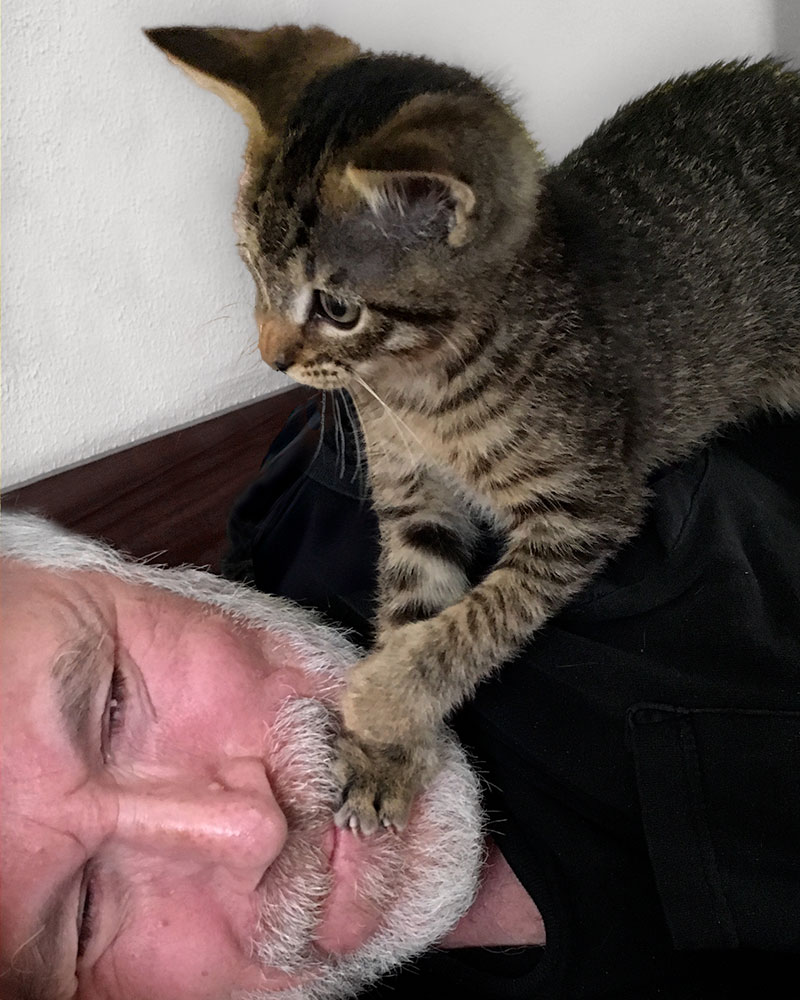I’m not very good at negotiating with cats. When our big, gentle, orange cat Timmy spreads out on my desk and makes it impossible to reach my computer keyboard, asking him to scootch over to the right is useless. At the same time, I can’t chase him away, because I don’t want him to feel unloved. (Timmy is deep-rootedly insecure.) So what I end up doing is launching a virtual keyboard onscreen and typing one letter at a time with my mouse.
When our perpetually inquisitive tabby Mary Beth jumps up on the kitchen table in the hope that I’ll share my lunch with her, my telling her that “there’s nothing here that cats eat!” doesn’t help. I can’t very well push her off the table — using my greater size and strength against her feels unfair — so I usually just take my lunch elsewhere. My wife Debra will often walk into the kitchen, see me standing at the counter next to the sink eating my sandwich, and shake her head sadly.
The bigger problem is that I’m not much better at negotiating with people than I am with cats. Debra and I used to run a business together, writing and producing educational and training materials. Whenever a potential client asked us for a bid on a project, I would try to figure out ways to cut costs in order to ask for as little money as possible. This wasn’t because I was trying to undercut the competition — in many cases, there was no competition — but because I knew that education and training are chronically underfunded, and I didn’t want the client to have to spend more money than necessary. This approach to the bidding process occasionally led to awkwardness when the client — not understanding that I had already cut the budget to the bone — tried to bargain me down.
People have tried to explain to me that that’s not how the negotiation process is supposed to work. I’m supposed to start with a bid that’s unreasonably high; the client is supposed to start with an offer that’s unreasonably low; and then we’re supposed to meet in the middle. But I could never bring myself to do it that way. It would be disingenuous to pretend that I was offering a fair price when I knew that I wasn’t.
I don’t do much better when I’m on the other side of the negotiation. If I’m at a market in another country where bargaining over price is the norm, I can’t bring myself to start with an unrealistically low bid. It feels disrespectful, as if I’m dismissing the time and care that the artisan put into making the product. (And yes, I understand that in those cultures, failure to bargain aggressively is what’s considered disrespectful. But even though I understand that intellectually, I still have trouble doing something that doesn’t feel right emotionally.)
I have to confess that this attitude doesn’t run in my family. When my father was in the army and was stationed at a base in San Antonio, my mother would often cross the border into Mexico. Although she had grown up in the Bronx and had never been to a Spanish-speaking country, she had learned to speak fluent Spanish. Speaking in English, and convincingly playing the role of the young white woman that she was, she would make a ridiculously low offer on a product in a market. The merchants would confer — in Spanish, right in front of her — on how low they were willing to go, and she would respond by offering that price in perfect Spanish. (Or so the story goes. Not yet having been born at that time, I can’t confirm that these too-good-to-believe transactions actually happened.)
My difficulty with negotiation is not only a problem in business settings. Whenever Debra and I have a disagreement, we tend to be more protective of each other than of ourselves. “I’ll go along with whatever you want,” I’ll say, and she’ll respond with “But what about what you want?” Years ago, when we were seeing a counselor during a difficult point in our marriage, he couldn’t believe that we engaged in that dynamic. “That’s not how it’s supposed to work,” he said, with some exasperation. “You tell Debra what you want,” he said to me, “and then you tell Mark what you want,” he said to Debra, “and then you work out a compromise!”
That idea came as a complete revelation to me. I’m not sure we ever managed to fully adopt that model, but fortunately, after 33 years of marriage, we no longer find much to disagree about. In any case, I still manage better with Debra than with the cats.

Recent Comments